
Solomon, also called Jedidiah, was, according to the Hebrew Bible or Old Testament, Quran, and Hadiths, a fabulously wealthy and wise king of the United Kingdom of Israel who succeeded his father, King David. The conventional dates of Solomon's reign are about 970 to 931 BCE, normally given in alignment with the dates of David's reign. He is described as king of the United Monarchy, which broke apart into the northern Kingdom of Israel and the southern Kingdom of Judah shortly after his death. Following the split, his patrilineal descendants ruled over Judah alone.
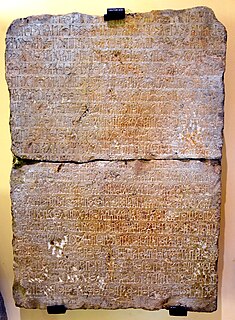
Sheba is a kingdom mentioned in the Hebrew Bible and the Quran. Sheba features in Jewish, Muslim, and Christian, particularly Ethiopian Christian, traditions. It was the home of the biblical "Queen of Sheba", who is left unnamed in the Bible, but receives the names Makeda in Ethiopian and Bilqīs in Arabic tradition.

Menelik I, or Menilek was the first Solomonic Emperor of Ethiopia. According to Kebra Nagast, a 12th-century record, in the 10th century BC he is said to have inaugurated the Solomonic dynasty of Ethiopia, so named because Menelik I was the son of the biblical King Solomon of ancient Israel and of Makeda, the Ethiopian Queen of Sheba.
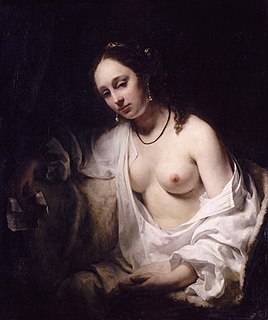
Bathsheba was the wife of Uriah the Hittite and later of David, according to the Hebrew Bible. She is most known for the biblical narrative in which she was summoned by King David, who had seen her bathing and lusted after her. She was the mother of Solomon, who succeeded David as king, making her the Queen mother.
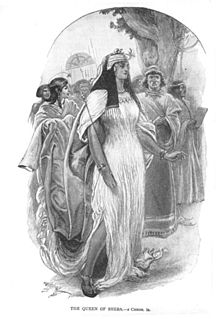
The Queen of Sheba is a figure first mentioned in the Hebrew Bible. In the original story, she brings a caravan of valuable gifts for the Israelite King Solomon. This tale has undergone extensive Jewish, Islamic and Ethiopian elaborations, and has become the subject of one of the most widespread and fertile cycles of legends in the Middle East.

Sir Edward John Poynter, 1st Baronet was an English painter, designer, and draughtsman, who served as President of the Royal Academy.

Saba’ is the 34th chapter (sūrah) of the Qur'an with 54 verses (āyāt). It discusses the lives of Solomon and David, a story about the people of Sheba, challenges and warnings against the disbelievers as well as the promises related to the Day of Judgment.
Sheba is a southern kingdom mentioned in Biblical scriptures and the Qur'an. Sheba may also refer to:

The Queen of Sheba (1921) is a silent drama film produced by Fox studios about the story of the ill-fated romance between Solomon, King of Israel, and the Queen of Sheba. Written and directed by J. Gordon Edwards, it starred Betty Blythe as the Queen and Fritz Leiber Sr. as King Solomon. The film is well known amongst silent film buffs for the risqué costumes worn by Blythe, as evidenced by several surviving stills taken during the production. Only a short fragment of the film survives.

Solomon, HWV 67, is an English oratorio by George Frideric Handel. The anonymous libretto – currently thought to have been penned by the English Jewish poet/playwright Moses Mendes (d.1758) – is based on the biblical stories of the wise king Solomon from the First Book of Kings and the Second Book of Chronicles, with additional material from Antiquities of the Jews by ancient historian Flavius Josephus. The music was composed between 5 May and 13 June 1748, and the first performance took place on 17 March 1749, with Caterina Galli in the title role at the Covent Garden Theatre in London, where it had two further performances. Handel revived the work in 1759.

Solomon and Sheba is a 1959 American epic historical romance film directed by King Vidor, shot in Technirama, and distributed by United Artists. The film dramatizes events described in The Bible—the tenth chapter of the First Kings and the ninth chapter of Second Chronicles.

The Queen of Sheba's Pearls is a 2004 Swedish-British drama film set in England post-WWII. Helena Bergström plays Nancy Ackerman who mysteriously arrives on the Pretty family's doorstep. Ackerman looks eerily similar to Jack Bradley's mother who inexplicably died in an WWII-related accident 8 years prior. As the film progresses, it becomes clear that Ackerman is the identical twin separated from Jack's mother at birth. Meanwhile Jack's father, a former marine, has clouded feelings for Ackerman; he cannot decide if his feelings for her are growing on their own merits or are based on those towards his deceased wife. Ackerman also proves to be an unsettling force in Jack's life by offering advice that turns out to be eerily omniscient and fairy godmother-like. The movie was produced, directed and written by Colin Nutley who is married to the film's star, Helena Bergström.

La reine de Saba is a grand opera in four or five acts by Charles Gounod to a libretto by Jules Barbier and Michel Carré inspired by Gérard de Nerval's La Reine de Saba, in Le voyage en Orient. It was premiered at the Salle Le Peletier by the Paris Opera on February 28, 1862. The magnificent first production was directed by Eugène Cormon, with costumes designed by Alfred Albert and Paul Lormier, and scenery by Édouard Desplechin, Charles-Antoine Cambon and Joseph Thierry, Hugues Martin, and Joseph Nolau and Auguste Alfred Rubé.

Nad Al Sheba is a locality in Dubai, United Arab Emirates (UAE). Situated south of the Dubai Creek, Nad Al Sheba is best known for its racecourse, the Nad Al Sheba Racecourse, which hosted the Dubai World Cup annually until 2009
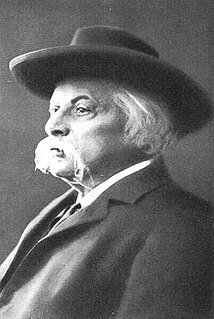
Die Königin von Saba is an opera in four acts by Karl Goldmark. The German libretto by Hermann Salomon Mosenthal sets a love triangle into the context of the Queen of Sheba's visit to the court of King Solomon, recorded in First Kings 10:1–13. The plot centres on a love triangle not found in the Bible between the Queen of Sheba, Assad, and Sulamith.

The Queen of Sheba is a 1952 Italian adventure film directed by Pietro Francisci.

The Ring of Solomon is a children's novel of alternate history, fantasy and magic. It is a prequel to the Bartimaeus trilogy, written by British author Jonathan Stroud. The first edition (paperback) was published in Oct. 2010 by Doubleday in UK.
The Queen of Sheba's Palace is one of several places popularly held to be the residence of the legendary Queen of Sheba. It may refer to:

The Order of the Queen of Sheba was originally instituted as a ladies' order in 1922 in the Ethiopian Empire by Empress Zawditu.
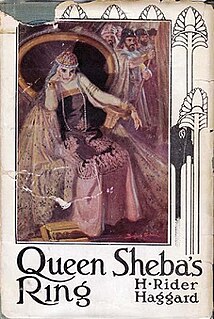
Queen Sheba's Ring is a 1910 adventure novel by H. Rider Haggard set in central Africa. It resembles the author's earlier works King Solomon's Mines and She, featuring plotting priests, beautiful women, and daring British adventurers.



















